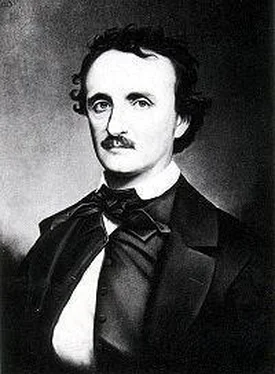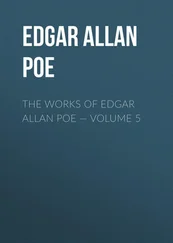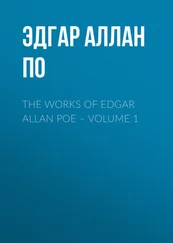Эдгар По - Works of Edgar Allan Poe
Здесь есть возможность читать онлайн «Эдгар По - Works of Edgar Allan Poe» весь текст электронной книги совершенно бесплатно (целиком полную версию без сокращений). В некоторых случаях можно слушать аудио, скачать через торрент в формате fb2 и присутствует краткое содержание. Жанр: Старинная литература, на английском языке. Описание произведения, (предисловие) а так же отзывы посетителей доступны на портале библиотеки ЛибКат.
- Название:Works of Edgar Allan Poe
- Автор:
- Жанр:
- Год:неизвестен
- ISBN:нет данных
- Рейтинг книги:4 / 5. Голосов: 1
-
Избранное:Добавить в избранное
- Отзывы:
-
Ваша оценка:
- 80
- 1
- 2
- 3
- 4
- 5
Works of Edgar Allan Poe: краткое содержание, описание и аннотация
Предлагаем к чтению аннотацию, описание, краткое содержание или предисловие (зависит от того, что написал сам автор книги «Works of Edgar Allan Poe»). Если вы не нашли необходимую информацию о книге — напишите в комментариях, мы постараемся отыскать её.
Works of Edgar Allan Poe — читать онлайн бесплатно полную книгу (весь текст) целиком
Ниже представлен текст книги, разбитый по страницам. Система сохранения места последней прочитанной страницы, позволяет с удобством читать онлайн бесплатно книгу «Works of Edgar Allan Poe», без необходимости каждый раз заново искать на чём Вы остановились. Поставьте закладку, и сможете в любой момент перейти на страницу, на которой закончили чтение.
Интервал:
Закладка:
Passing out of the closet with their prisoner, the officers went through a sort of ante-chamber, in which nothing material was found, to the chemist's sleeping-room. They here rummaged some drawers and boxes, but discovered only a few papers, of no importance, and some good coin, silver and gold. At length, looking under the bed, they saw a large, common hair trunk, without hinges, hasp, or lock, and with the top lying carelessly across the bottom portion. Upon attempting to draw this trunk out from under the bed, they found that, with their united strength (there were three of them, all powerful men), they 'could not stir it one inch.' Much astonished at this, one of them crawled under the bed, and looking into the trunk, said:
'No wonder we couldn't move it -- why it's full to the brim of old bits of brass!'
Putting his feet, now, against the wall so as to get a good purchase, and pushing with all his force, while his companions pulled with an theirs, the trunk, with much difficulty, was slid out from under the bed, and its contents examined. The supposed brass with which it was filled was all in small, smooth pieces, varying from the size of a pea to that of a dollar; but the pieces were irregular in shape, although more or less flat-looking, upon the whole, 'very much as lead looks when thrown upon the ground in a molten state, and there suffered to grow cool.' Now, not one of these officers for a moment suspected this metal to be any thing but brass. The idea of its being gold never entered their brains, of course; how could such a wild fancy have entered it? And their astonishment may be well conceived, when the next day it became known, all over Bremen, that the 'lot of brass' which they had carted so contemptuously to the police office, without putting themselves to the trouble of pocketing the smallest scrap, was not only gold -- real gold -- but gold far finer than any employed in coinage-gold, in fact, absolutely pure, virgin, without the slightest appreciable alloy.
I need not go over the details of Von Kempelen's confession (as far as it went) and release, for these are familiar to the public. That he has actually realized, in spirit and in effect, if not to the letter, the old chimaera of the philosopher's stone, no sane person is at liberty to doubt. The opinions of Arago are, of course, entitled to the greatest consideration; but he is by no means infallible; and what he says of bismuth, in his report to the Academy, must be taken cum grano salis. The simple truth is, that up to this period all analysis has failed; and until Von Kempelen chooses to let us have the key to his own published enigma, it is more than probable that the matter will remain, for years, in statu quo. All that as yet can fairly be said to be known is, that 'Pure gold can be made at will, and very readily from lead in connection with certain other substances, in kind and in proportions, unknown.'
Speculation, of course, is busy as to the immediate and ultimate results of this discovery -- a discovery which few thinking persons will hesitate in referring to an increased interest in the matter of gold generally, by the late developments in California; and this reflection brings us inevitably to another -- the exceeding inopportuneness of Von Kempelen's analysis. If many were prevented from adventuring to California, by the mere apprehension that gold would so materially diminish in value, on account of its plentifulness in the mines there, as to render the speculation of going so far in search of it a doubtful one -- what impression will be wrought now, upon the minds of those about to emigrate, and especially upon the minds of those actually in the mineral region, by the announcement of this astounding discovery of Von Kempelen? a discovery which declares, in so many words, that beyond its intrinsic worth for manufacturing purposes (whatever that worth may be), gold now is, or at least soon will be (for it cannot be supposed that Von Kempelen can long retain his secret), of no greater value than lead, and of far inferior value to silver. It is, indeed, exceedingly difficult to speculate prospectively upon the consequences of the discovery, but one thing may be positively maintained -- that the announcement of the discovery six months ago would have had material influence in regard to the settlement of California.
In Europe, as yet, the most noticeable results have been a rise of two hundred per cent. in the price of lead, and nearly twenty-five per cent. that of silver.
________
The End | Go to top
X-ing a Paragrab
AS it is well known that the 'wise men' came 'from the East,' and as Mr. Touch-and-go Bullet-head came from the East, it follows that Mr. Bullet-head was a wise man; and if collateral proof of the matter be needed, here we have it -- Mr. B. was an editor. Irascibility was his sole foible, for in fact the obstinacy of which men accused him was anything but his foible, since he justly considered it his forte. It was his strong point -- his virtue; and it would have required all the logic of a Brownson to convince him that it was 'anything else.'
I have shown that Touch-and-go Bullet-head was a wise man; and the only occasion on which he did not prove infallible, was when, abandoning that legitimate home for all wise men, the East, he migrated to the city of Alexander-the-Great-o-nopolis, or some place of a similar title, out West.
I must do him the justice to say, however, that when he made up his mind finally to settle in that town, it was under the impression that no newspaper, and consequently no editor, existed in that particular section of the country. In establishing 'The Tea-Pot' he expected to have the field all to himself. I feel confident he never would have dreamed of taking up his residence in Alexander-the-Great-o-nopolis had he been aware that, in Alexander-the-Great-o-nopolis, there lived a gentleman named John Smith (if I rightly remember), who for many years had there quietly grown fat in editing and publishing the 'Alexander-the-Great-o-nopolis Gazette.' It was solely, therefore, on account of having been misinformed, that Mr. Bullet-head found himself in Alex-suppose we call it Nopolis, 'for short' -- but, as he did find himself there, he determined to keep up his character for obst -- for firmness, and remain. So remain he did; and he did more; he unpacked his press, type, etc., etc., rented an office exactly opposite to that of the 'Gazette,' and, on the third morning after his arrival, issued the first number of 'The Alexan' -- that is to say, of 'The Nopolis Tea-Pot' -- as nearly as I can recollect, this was the name of the new paper.
The leading article, I must admit, was brilliant -- not to say severe. It was especially bitter about things in general -- and as for the editor of 'The Gazette,' he was torn all to pieces in particular. Some of Bullethead's remarks were really so fiery that I have always, since that time, been forced to look upon John Smith, who is still alive, in the light of a salamander. I cannot pretend to give all the 'Tea-Pot's' paragraphs verbatim, but one of them runs thus:
'Oh, yes! -- Oh, we perceive! Oh, no doubt! The editor over the way is a genius -- O, my! Oh, goodness, gracious! -- what is this world coming to? Oh, tempora! Oh, Moses!'
A philippic at once so caustic and so classical, alighted like a bombshell among the hitherto peaceful citizens of Nopolis. Groups of excited individuals gathered at the corners of the streets. Every one awaited, with heartfelt anxiety, the reply of the dignified Smith. Next morning it appeared as follows:
'We quote from "The Tea-Pot" of yesterday the subjoined paragraph: "Oh, yes! Oh, we perceive! Oh, no doubt! Oh, my! Oh, goodness! Oh, tempora! Oh, Moses!" Why, the fellow is all O! That accounts for his reasoning in a circle, and explains why there is neither beginning nor end to him, nor to anything he says. We really do not believe the vagabond can write a word that hasn't an O in it. Wonder if this O-ing is a habit of his? By-the-by, he came away from Down-East in a great hurry. Wonder if he O's as much there as he does here? "O! it is pitiful."'
Читать дальшеИнтервал:
Закладка:
Похожие книги на «Works of Edgar Allan Poe»
Представляем Вашему вниманию похожие книги на «Works of Edgar Allan Poe» списком для выбора. Мы отобрали схожую по названию и смыслу литературу в надежде предоставить читателям больше вариантов отыскать новые, интересные, ещё непрочитанные произведения.
Обсуждение, отзывы о книге «Works of Edgar Allan Poe» и просто собственные мнения читателей. Оставьте ваши комментарии, напишите, что Вы думаете о произведении, его смысле или главных героях. Укажите что конкретно понравилось, а что нет, и почему Вы так считаете.












